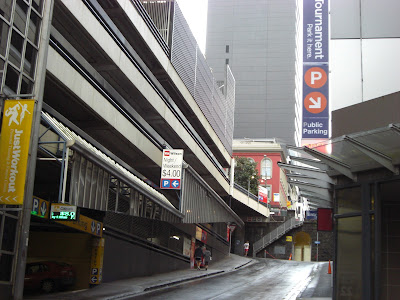Priced parking often prompts worries about monopoly.
Performance pricing for parking managed by the public-sector should help avoid over-pricing in that part of the parking scene (if parking usage drops at any location, then the demand-responsive prices will soon follow suit).
But governments don't (usually) control private sector parking prices. So, unless the Adaptive Parking agenda includes steps against monopoly or market power, it may be vulnerable to cries of 'gouging!', 'exploitation!', 'abuse of monopoly!'.
We can see these concerns in this letter to the editor in Singapore's Today newspaper about parking at the Budget Terminal of Singapore's Changi Airport:
This gives me an excuse to introduce the fifth and final Adaptive Parking reform thrust:
The motivation for including this reform direction in Adaptive Parking is the worry expressed in the letter above. Adaptive Parking points towards a more market-responsive parking system but this would be undermined if there is rampant abuse of monopoly or market power. You should rightly be wary of market pricing and responsive supply unless you get reassurance against monopoly.
Tackling parking monopoly can take two contrasting directions. If direct competition is impossible and if the substitutes are hopeless, then regulation (or public-sector provision) may necessary, as the letter writer above suggests. But in the case of parking, it is probably better to first try to foster more competition and enriched alternatives, rather than resort too hastily to regulation of prices or supply.
So Adaptive Parking suggests that we apply the usual tools of anti-trust or competition policy to parking. This already happens in some areas, especially city centres and airports. Mergers and acquisitions in the parking industry already face scrutiny from competition watchdog agencies. If Adaptive Parking succeeds in spreading a more market-oriented approach to parking, then more locations will need to apply competition policy to their parking systems.
Improving mobility options and alternatives to driving is another way to ease worries about local parking monopolies. After all, market power requires both barriers to entry AND a lack of close substitutes. Enhanced taxi services, public transport, walkability and cycling facilities can all help to reduce the ability of any localised parking monopoly to over-charge or under-deliver.
On a more positive note, enhancing competition and enriching mobility options should give a boost to the market-responsiveness of any neighbourhood parking scene, even if there is no clear-cut monopoly to combat.
P.S. Actually, I am not quite convinced that the controversy over Singapore Budget Terminal parking fees is a good example of monopoly abuse. But never mind. That letter to the editor was a useful lead-in for this post.
Performance pricing for parking managed by the public-sector should help avoid over-pricing in that part of the parking scene (if parking usage drops at any location, then the demand-responsive prices will soon follow suit).
But governments don't (usually) control private sector parking prices. So, unless the Adaptive Parking agenda includes steps against monopoly or market power, it may be vulnerable to cries of 'gouging!', 'exploitation!', 'abuse of monopoly!'.
We can see these concerns in this letter to the editor in Singapore's Today newspaper about parking at the Budget Terminal of Singapore's Changi Airport:
"Monopoly parking should be regulated" Heng Zhao Weng, Feb 14, 2012
The underlying reason for the recent complaints of exorbitant parking at the Budget Terminal ... is straightforward. Parking rates in the city are more or less determined by fair market forces based on supply and demand ... The same cannot be said for the business practices in some remote places. ... The authorities should act. When there is no alternative parking within so many metres of a charging car park, rates fixed by regulation should apply.
This gives me an excuse to introduce the fifth and final Adaptive Parking reform thrust:
Competition and Options: ensure adequate alternatives to driving and/or competition among parking facilities, so that people have options for accessing the area.
 |
| CBDs, like Auckland's here, often already have strong competition among parking operators and rich mobility options for reaching the area by various means of transport. |
The motivation for including this reform direction in Adaptive Parking is the worry expressed in the letter above. Adaptive Parking points towards a more market-responsive parking system but this would be undermined if there is rampant abuse of monopoly or market power. You should rightly be wary of market pricing and responsive supply unless you get reassurance against monopoly.
Tackling parking monopoly can take two contrasting directions. If direct competition is impossible and if the substitutes are hopeless, then regulation (or public-sector provision) may necessary, as the letter writer above suggests. But in the case of parking, it is probably better to first try to foster more competition and enriched alternatives, rather than resort too hastily to regulation of prices or supply.
So Adaptive Parking suggests that we apply the usual tools of anti-trust or competition policy to parking. This already happens in some areas, especially city centres and airports. Mergers and acquisitions in the parking industry already face scrutiny from competition watchdog agencies. If Adaptive Parking succeeds in spreading a more market-oriented approach to parking, then more locations will need to apply competition policy to their parking systems.
Improving mobility options and alternatives to driving is another way to ease worries about local parking monopolies. After all, market power requires both barriers to entry AND a lack of close substitutes. Enhanced taxi services, public transport, walkability and cycling facilities can all help to reduce the ability of any localised parking monopoly to over-charge or under-deliver.
On a more positive note, enhancing competition and enriching mobility options should give a boost to the market-responsiveness of any neighbourhood parking scene, even if there is no clear-cut monopoly to combat.
P.S. Actually, I am not quite convinced that the controversy over Singapore Budget Terminal parking fees is a good example of monopoly abuse. But never mind. That letter to the editor was a useful lead-in for this post.

Comments
Post a Comment